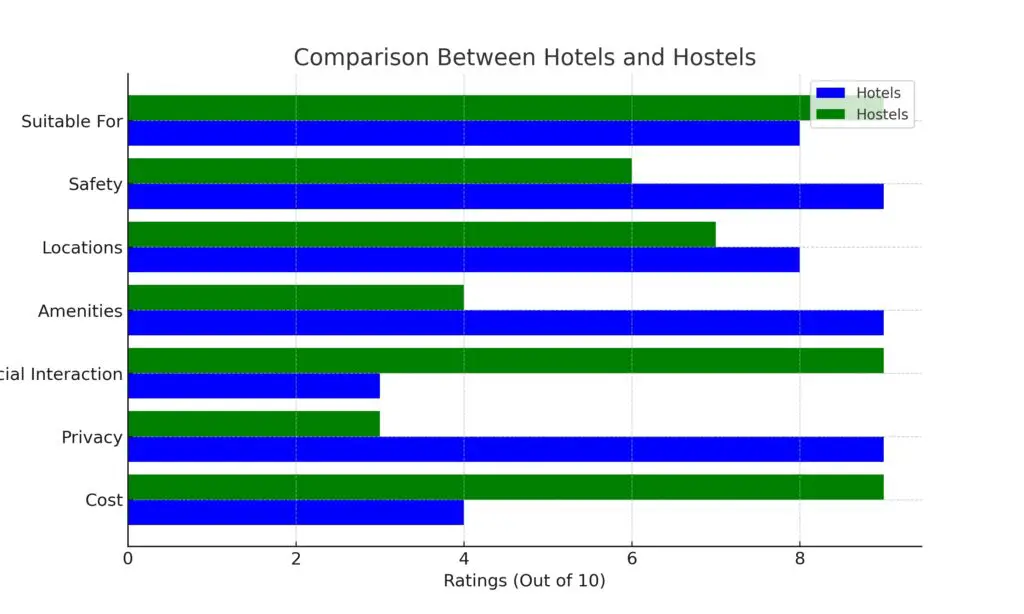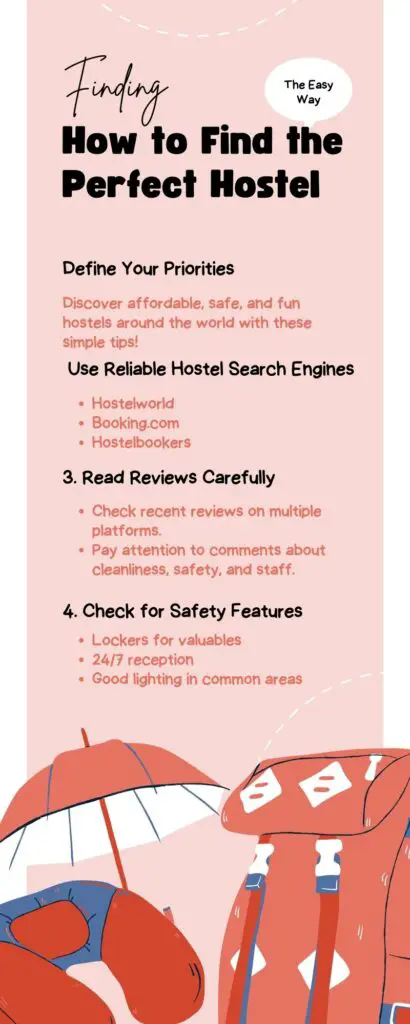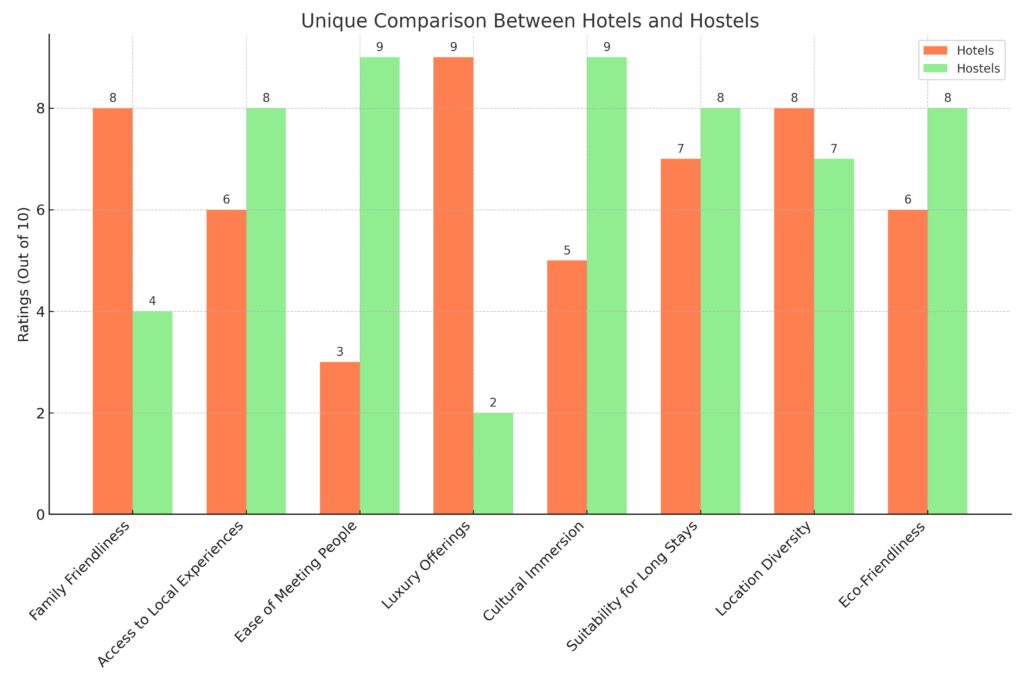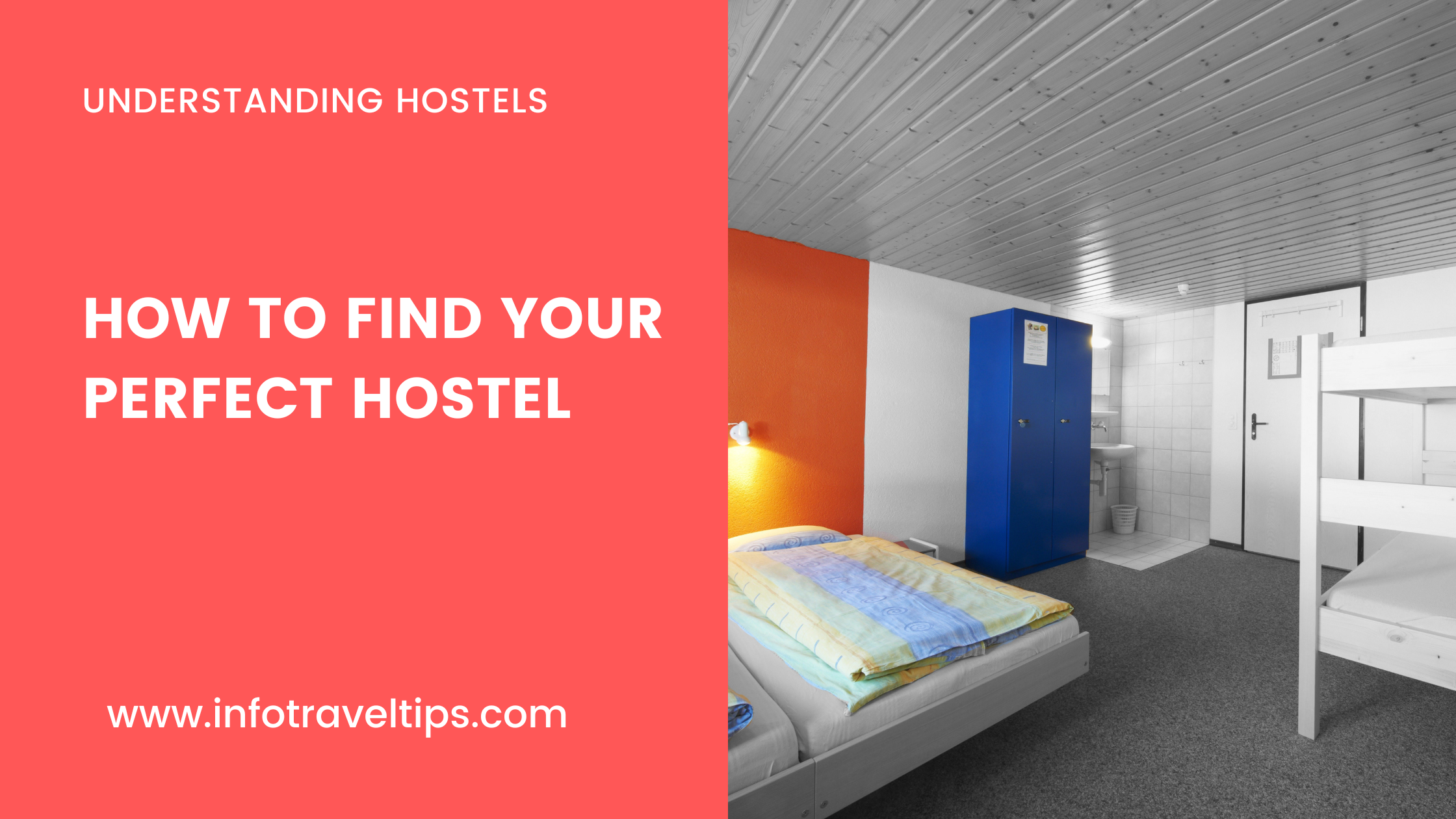Discover essential tips on how to find a hostel that suits your travel needs. From understanding the differences between hostels and hotels to finding budget-friendly and sociable accommodations. When planning a trip, one of the crucial decisions is choosing where to stay. The choice often boils down to two popular options: hostels and hotels. This comprehensive guide will compare and contrast hostels and hotels, helping you decide which is more suitable for your travel needs.
How to Find a Hostel
Understanding Hostels
Budget-Friendly: Hostels are known for their affordability. They are ideal for travelers on a tight budget, especially students and backpackers.
Shared Spaces: Hostels typically feature dormitory-style rooms with shared bathrooms. This setup encourages a communal atmosphere, making it easy to meet fellow travelers.
Amenities: While hostels offer basic amenities, they may lack the luxury of hotels. Common areas like kitchens and lounges are standard, but extras like room service are rare.
Cultural Exchange: Hostels are hubs for cultural exchange. They often host events and social gatherings, providing opportunities to interact with people from diverse backgrounds.

Exploring Hotels
Comfort and Privacy: Hotels offer private rooms with en-suite bathrooms, ensuring comfort and privacy. This makes them suitable for those seeking a quiet, more personalized space.
Variety of Options: Hotels range from budget to luxury, offering various levels of comfort and amenities. You can choose based on your preferences and budget.
Services and Facilities: Hotels typically provide a wider range of services, including room service, laundry, and concierge. Higher-end hotels may feature facilities like gyms, spas, and restaurants.
Family-Friendly: For families, hotels often provide more convenience and safety, with options for interconnected rooms and child-friendly amenities.
Hostel or Hotel: Making the Right Choice
Consider Your Travel Style: If you’re a solo traveler or a group of friends looking to socialize and don’t mind sharing space, a hostel could be a great fit. For families, couples seeking privacy, or business travelers, hotels might be more appropriate.
Budget Considerations: Hostels are generally more budget-friendly. However, there are budget hotels that might offer competitive pricing with added privacy.
Location: Both hostels and hotels can be found in central locations. Consider proximity to key attractions, public transportation, and the overall safety of the neighborhood.
Duration of Stay: For longer stays, a hostel might be more economical. Some hostels offer discounts for extended stays.
Experience: Hostels offer a unique, community-oriented experience. Hotels, on the other hand, are geared towards providing a more standardized and private experience.

Additional Considerations in Choosing Between a Hostel and a Hotel
Cultural Impact: In many destinations, hostels are more than just a place to sleep; they’re part of the local culture. They may be located in historic buildings or neighborhoods, offering a unique cultural experience. Hotels, particularly chains, tend to provide a more standardized experience, though boutique and luxury hotels can also offer unique cultural insights.
Environmental Concerns: Eco-conscious travelers might prefer hostels, as many prioritize sustainability with practices like recycling, using renewable energy, and reducing waste. Some hotels are also embracing green practices, but this varies widely by the establishment.
Work and Connectivity: For digital nomads or business travelers, hotels usually offer better work facilities, like desks in rooms and business centers. While some hostels provide workspaces, the environment may be more communal and less private.
Safety and Security: Security is a key concern, especially for solo travelers. Hostels often have lockers for personal belongings, but hotels generally offer more security in terms of room safety and personal items.
Food and Dining: Hotels might have one or more in-house restaurants, ranging from casual to fine dining, along with breakfast services. Hostels may not have such extensive offerings, but they usually have shared kitchens where you can prepare your meals, which can be a bonus for long-term travelers or those on a strict budget.
Booking Process and Cancellation Policies: Booking and cancellation policies can differ significantly. Hostels often cater to more flexible travel plans, while hotels may have stricter booking and cancellation rules, especially during peak seasons.

Tailoring Your Choice to Your Trip
Mixing Accommodations: On a longer trip, you might consider staying in both hostels and hotels at different points in your journey. This can offer a balance between social interaction, cultural immersion, and privacy.
Reading Reviews: Before making a decision, read reviews of the specific hostel or hotel. These can provide valuable insights into the actual experiences of other travelers.
Considering the Destination: In some places, either a hostel or a hotel might be a better fit due to the local culture, the type of attractions, or the overall vibe of the destination.
How to Read Hostel Reviews Like a Pro”
Choosing the right hostel can be the key to a memorable travel experience. With the abundance of online reviews at your fingertips, making an informed choice should be easier than ever. However, the sheer volume of opinions can be overwhelming. This comprehensive guide is designed to help you navigate through hostel reviews effectively, ensuring you make the best choice for your stay.
Understanding the Importance of Reviews
Why Reviews Matter: Reviews provide real-life insights from fellow travelers who have experienced the hostel first-hand. They can offer valuable information about the hostel’s atmosphere, cleanliness, location, and amenities that you might not find in the hostel’s description.

Decoding Star Ratings and Comments
- Balancing Ratings with Reviews: While star ratings give a quick overview, they don’t capture the nuances of a guest’s experience. Always read the accompanying reviews for a more comprehensive understanding.
- Consistency is Key: Look for consistent patterns in reviews. If multiple reviews highlight the same positives or negatives, it’s likely an accurate representation of the hostel.
- Prioritize Recent Feedback: Hostels can change over time. A review from a year ago may not be relevant now. Focus on the most recent reviews to get a sense of the current conditions and management.
- Contextual Understanding: Not all negative reviews are deal-breakers. Understand the context and specifics of the complaint. What might be a minor issue for one traveler could be significant for another.
- Personal Relevance: Assess whether the issues raised align with your travel concerns. For example, if nightlife is not your priority, a review criticizing the hostel’s quiet atmosphere might be a positive for you.
Identifying Fake Reviews
- Watch for Red Flags: Be cautious of overly glowing reviews that lack detail or seem generic. Similarly, overly negative reviews that are vague or seem spiteful should be taken with a grain of salt.
- Know What Matters to You: Identify your top priorities, such as cleanliness, safety, location, or social atmosphere. Focus on reviews that address these aspects.
- Looking for Specifics: Pay attention to details in reviews. Mentions of comfy beds, outstanding staff, cleanliness, or excellent location can be deciding factors.
- Consider the Source: Reviews from travelers with similar profiles or travel styles to yours can be more relevant. For example, reviews from solo travelers can be particularly insightful if you’re planning a solo trip.
- Informed Questions: Use insights from reviews to ask informed questions when booking. For instance, if there are mixed reviews about Wi-Fi strength, inquire about it directly with the hostel.
- Setting Realistic Expectations: Reviews can help set realistic expectations about your stay, preparing you for both the perks and the quirks of the hostel.

Cross-Reference with Multiple Platforms
- Check Various Sites: Don’t rely solely on one review platform. Cross-reference reviews across different sites like Hostelworld, Booking.com, and Google Reviews to get a well-rounded view.
- Value in Specifics: Reviews that provide specific details about aspects like the communal areas, kitchen facilities, or the booking process are often more reliable and helpful.
- Balanced Perspectives: Reviews that mention both pros and cons are generally more credible. They provide a realistic picture of what to expect.
- Hostel’s Engagement: Pay attention to how the hostel management responds to reviews, especially negative ones. This can give you an insight into their customer service attitude and willingness to improve.

Tips for Reading Between the Lines
- Reading Subtly: Sometimes, what’s not said in a review is as important as what is said. If reviews are vague about cleanliness or safety, it might be a subtle indication of issues in these areas.
- Packing Essentials: Reviews might mention if the hostel lacks certain amenities, like towels or hairdryers, to help you pack accordingly.
- Setting the Right Expectations: Knowing the hostel’s strengths and weaknesses in advance helps set the right expectations, leading to a more satisfying stay.
- Social Dynamics: If meeting new people is a priority, look for reviews that describe the social atmosphere of the hostel. Some hostels are known for their party vibes, while others are more laid-back and relaxed.
Conclusion
Choosing between a hostel and a hotel depends on various factors like budget, travel style, and the kind of experience you’re seeking. Hostels offer an affordable, social environment, suited for younger travelers and those who enjoy communal living. Hotels provide more privacy, comfort, and services, catering to families, couples, and those who prefer a quiet and relaxed environment. By considering these factors, you can make an informed decision that enhances your travel experience. Remember, the best choice is the one that aligns with your personal travel needs and expectations.


